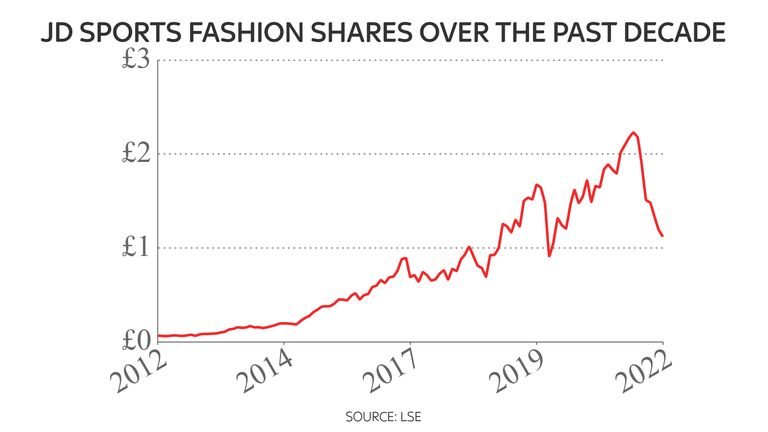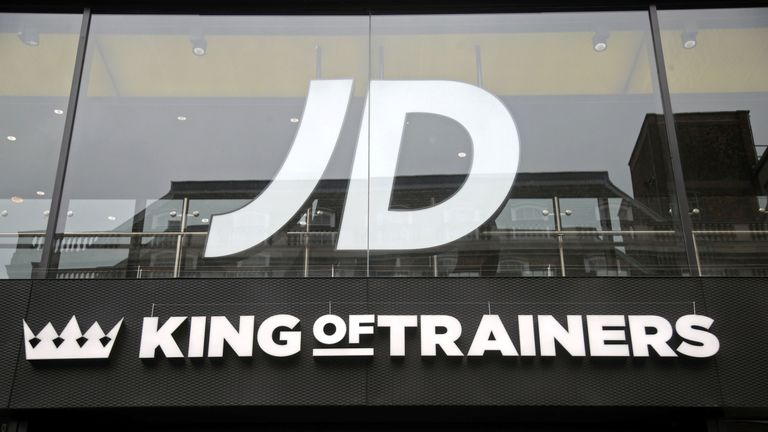[ad_1]
Peter Cowgill, arguably the most successful British retailer of the last two decades, sensationally stepped down this evening as executive chairman of JD Sports amid speculation he had been ousted.
His departure, with immediate effect, was announced just 12 minutes before the close of today’s stock market session and the news immediately sent shares of JD Sports down by just over 6% – wiping £377m from the company’s market value.
Announcing the move JD Sports said that, as a consequence of an ongoing review of its internal governance and controls, it had decided to accelerate the separation of the roles of chair and chief executive.
JD announced in July last year that it would split the roles of chairman and chief executive over the following 12 months following criticism of its corporate governance by shareholders.
Some investors in JD have long been concerned about the power Mr Cowgill wielded in the boardroom.
He has been running JD – which describes itself in its marketing as the ‘King of Trainers’ – without a chief executive since Barry Bown left in 2014.
Those concerns intensified when, in February, the company was fined £4.3m by the Competition and Markets Authority for failing to have safeguards in place, sharing commercially sensitive information and failing to alert the regulator over a meeting between Mr Cowgill and Mr Bown, who had gone on to become chief executive of Footasylum, which JD had previously owned but which it was forced to sell by the watchdog on competition grounds.
Some shareholders had also groused about a decision to pay Mr Cowgill a £4m bonus following a year in which JD received money from taxpayers for business rate relief and staff furloughs during COVID lockdowns.
JD said on Wednesday evening that Helen Ashton, currently a non-executive director at JD Sports and chair of the company’s audit and risk committee, would become interim non-executive chair.
Ms Ashton, who joined the JD board in November last year, has previously held executive level roles at the online fashion retailer ASOS, Lloyds Banking Group and Barclays.
Kath Smith, currently JD’s senior independent director, will become interim chief executive. She previously worked in the sector as managing director of the Adidas and Reebok brands and at the outdoor clothing group The North Face.
Ms Ashton said: “The business has developed strongly under Peter’s leadership into a world-leading multi-channel retailer with a proven strategy and clear momentum.
“However, as our business has become bigger and more complex, what is clear is that our internal infrastructure, governance and controls have not developed at the same pace.
“As we capitalise on the great opportunities ahead of us, the board is committed to ensuring that we have the highest standards of corporate governance and controls appropriate to a FTSE-100 company to support future growth.”
Speculation that 67-year old Mr Cowgill was nearing the end of his time at the company intensified when, in January this year, he sold £21m worth of shares in JD – equivalent to half his shareholding in the company.
Mr Cowgill’s departure brings down the curtain on one of the most successful retailing careers of recent times.
The Manchester United supporter, famed in the retail sector for his workaholic, seven-day-a-week approach to the job, had been at the helm since 2004 and taken JD Sports from being a small retailer to a FTSE 100 member with more than 2,500 outlets worldwide that, until recently, was valued at more than £8bn.
His genius was to identify the emerging trend for so-called ‘athleisure’ and spot that four brands – Reebok, Nike, Puma and Adidas – were set to dominate the sector.
He built close relationships with all of them and, unlike his rival Mike Ashley at Sports Direct, did his best to hug those suppliers close rather than fall out with them.
The stockbroker AJ Bell calculated in November last year that, since he became executive chairman in 2004, Mr Cowgill generated total shareholder returns of more than 15,000% – compared with just 211% for the FTSE 100.
Mr Cowgill, who grew up in Kearsley, just outside Bolton, was an entrepreneur from an early age, selling books on a rug from outside his family’s front door.
Standing out at school for outstanding skills in arithmetic, he studied at the University of Hull before qualifying as a chartered accountant but quickly left the firm he had qualified to set up his own accounting business, Cowgill Holloway, at the age of 28 above a Bolton barber shop. David Makin and John Wardle – the J and D in JD Sports – were among his first clients and he eventually ended up working with them.
Renowned for keeping his feet on the ground, despite his wealth, he prefers to drink with his old friends at his local, the Spread Eagle in Kearsley, over the high life.
Despite complaints from some investors over JD’s corporate governance, Mr Cowgill’s departure is likely to be greeted with dismay in some parts of the City, where he retains a substantial fan club.
Eleanora Dani, at the stockbroker and investment bank Shore Capital, said Mr Cowgill had been integral to JD’s success. She said that, while the separation of his roles had been flagged a more gradual process had been expected, with Mr Cowgill remaining as chairman for a couple of years.
She added: “The company is tightly managed with excellent cash generation, tight stock, and cost controls. In our view, JD Sports remains a best-in-class retailer…however, we are disappointed to see Mr Cowgill leaving and look forward to hearing more from the company.”
[ad_2]




